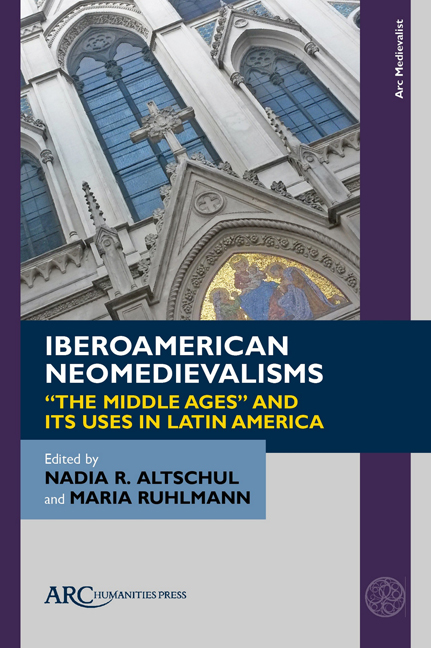Book contents
- Frontmatter
- Contents
- List of Illustrations
- Chapter 1 Postcolonizing Neomedievalism:An Introduction
- Chapter 2 The Criollo Invention of the Middle Ages
- Chapter 3 A Militant and Peasant-Based Medieval History in Brazil: Fanning the Spark of Hope
- Chapter 4 Neomedievalism and the Hagiography of Valdemiro Santiago: Neopentecostal Sanctification
- Chapter 5 The “Middle Ages” in the Brazilian Presidential Elections of 2018: The Left, the Right, and the Centre
- Chapter 6 Averroes in Mid-Colonial and Inter-Imperial Cordoba
- Chapter 7 Hypermedievalizing and De-Medievalizing Dante: Leopoldo Lugones’s and Jorge Luis Borges’s Rewritings of Inferno V
- Chapter 8 Borges and Kennings
- Chapter 9 Memory, Desire, and Sexual Identity in Manuel Mujica Lainez’s El unicornio
- Chapter 10 Rewriting and Visualizing the Cid: The Reconstruction of Medieval Gender and Race in Argentinian Graphic Novels
Chapter 9 - Memory, Desire, and Sexual Identity in Manuel Mujica Lainez’s El unicornio
Published online by Cambridge University Press: 18 November 2023
- Frontmatter
- Contents
- List of Illustrations
- Chapter 1 Postcolonizing Neomedievalism:An Introduction
- Chapter 2 The Criollo Invention of the Middle Ages
- Chapter 3 A Militant and Peasant-Based Medieval History in Brazil: Fanning the Spark of Hope
- Chapter 4 Neomedievalism and the Hagiography of Valdemiro Santiago: Neopentecostal Sanctification
- Chapter 5 The “Middle Ages” in the Brazilian Presidential Elections of 2018: The Left, the Right, and the Centre
- Chapter 6 Averroes in Mid-Colonial and Inter-Imperial Cordoba
- Chapter 7 Hypermedievalizing and De-Medievalizing Dante: Leopoldo Lugones’s and Jorge Luis Borges’s Rewritings of Inferno V
- Chapter 8 Borges and Kennings
- Chapter 9 Memory, Desire, and Sexual Identity in Manuel Mujica Lainez’s El unicornio
- Chapter 10 Rewriting and Visualizing the Cid: The Reconstruction of Medieval Gender and Race in Argentinian Graphic Novels
Summary
In 1965, the Argentinian writer Manuel Mujica Lainez (1910–1984) published El unicornio (The Unicorn; though translated as The Wandering Unicorn), a historical novel presenting a romanticized and idealized vision of the Middle Ages. The Unicorn is structured in nine chapters that include several narrative episodes. The first chapter begins with a short prologue presenting the medieval legend of the fairy Melusine, who falls in love with a mortal, Raymond, and abandons the faerie world to live with him. Even though she asks him to avoid looking at her while she takes her Saturday baths, he spies on her and discovers her transformation into a partially ophidian body. The discovery ends in the escape of Melusine, who will return only sporadically to their castle and their children. The remaining chapters of the novel are dedicated to Melusine's love and travels with the knight Aiol in search for the Holy Lance, a narrative that was entirely created by Mujica Lainez utilizing medieval elements and research.
In the novel, the fairy Melusine is a first-person narrator who tells the story of an event in her life that took place towards the end of the twelfth century. This story that Melusine recalls occurs between 1174 and 1187; therefore the context is the prelude to the third Crusade, and the action takes place in two main sites, France and the Holy Land. Her speech is like a memory or an autobiography: “In the year I’m talking about, 1174,” she says in the first chapter; “at the board of the Leper-King, on that October evening of 1177,” she specifies in the sixth one. Several details interspersed through the novel also place us in a context close to the publication of the book, during the 1960s. Here are just two illustrative examples: “It was the dawn of literature, and a glance will confirm that most heroes and heroines were of royal birth…See Proust— he makes this very plain”; and “[w]e were in the Middle Ages, and prodigies seemed blessedly natural then, as natural as going to the moon does now.” The fairy's quality of immortality and her role as narrator allow Mujica Lainez to advance a series of critical reflections about the society of his time, the sixties of the twentieth century (or, more generally, modernity), as well as some metanarrative comments.
- Type
- Chapter
- Information
- Iberoamerican NeomedievalismsThe Middle Ages' and Its Uses in Latin America, pp. 155 - 172Publisher: Amsterdam University PressPrint publication year: 2023
- 1
- Cited by

